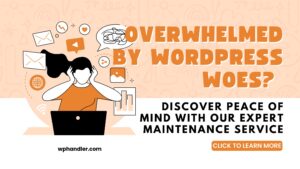Neglecting Regular Backups
Understanding the Importance of Backups
Let me tell you from experience, neglecting backups is like playing with fire. You never know when disaster might strike, whether it’s a server crash, malicious attacks, or even a simple human error. Regular backups ensure that your content is safe and that you can quickly restore your site if something goes wrong.
Many users think their web hosting will take care of backups. While some do offer basic options, it’s wise to independently set up a backup system. Relying solely on your host can be risky; I’ve seen friends lose everything because they didn’t have their options covered!
Using plugins like UpdraftPlus or BackupBuddy can automagically schedule backups for you. This convenience means you can focus on creating content instead of worrying about losing hours of work. Trust me, when you hear that dreaded “site down” alert, you’ll be grateful for the peace of mind that backups offer.
Ignoring Updates
The Risks of Outdated Software
Alright, let me spill the tea on updates. Ignoring them is one of the most common mistakes I’ve witnessed in the WordPress community. Software evolves, and with every update, developers fix bugs and improve security. Sticking with outdated themes and plugins is like leaving your door wide open for attackers.
There’s also the performance angle. Ever notice your site slowing down? Sometimes, older versions of software can conflict with newer ones, causing sluggishness. Regular updates minimize such risks, and they help maintain a seamless experience for visitors, which ultimately leads to better engagement.
Being on top of updates can feel like a chore, but trust me! Automating this process can keep your site running smoothly without your constant attention. I remember setting up auto-updates and feeling a weight lifted; it’s one less thing to worry about, right?
Not Monitoring Site Security
Understanding Threats to Your Site
Let’s have a chat about security. Scary stuff, right? You wouldn’t leave your front door unlocked, so why let your website be an easy target? Many WordPress users think security plugins are an all-in-one solution. While they’re excellent tools, they won’t cover everything unless you actively monitor them.
Regularly scanning your site for vulnerabilities is critical. I remember the first time I scanned my site and found a vulnerability that could’ve opened the floodgates to hackers. Who knows how many visitors I could have lost if it hadn’t been addressed? Make it a habit to check your security measures routinely and take action if something seems off.
Plugins like Sucuri or Wordfence are great starting points for monitoring security. They not only help prevent attacks but can also alert you when things go awry. Being proactive about your site security gives you the confidence to focus on creating rather than stressing.
Overlooking SEO Practices
The Impact of SEO on Your Website’s Visibility
Now, let’s get into SEO, folks! I can’t stress enough how important it is to keep your site optimized. Overlooking SEO means you might be missing out on potential visitors and sales. Every day, people are searching for what you offer; don’t let them miss finding you online because you didn’t implement basic SEO practices.
Keywords, folks! They’re not just buzzwords. I always start by researching what my audience is looking for. Then, I sprinkle those keywords throughout my content in a natural way. It’s not about stuffing them but rather incorporating them fluidly to improve readability and relevance.
Don’t forget about optimizing images, meta descriptions, and internal linking too! These small tweaks can greatly improve your site’s searchability. Trust me, a well-optimized site can lead to significant traffic boost without any additional ad spend!
Forgetting Performance Optimization
Why Speed Matters
Lastly, let’s talk performance. Remember the last time a website took ages to load? Frustrating, right? You don’t want your visitors experiencing that on your site. Page speed is a crucial factor, both for user experience and SEO! So, if you’re not actively working to optimize it, you might be losing visitors.
There are a ton of ways to speed up your site! I’ve personally found compressing images, leveraging browser caching, and minimizing HTTP requests to be game-changers. Tools such as Google PageSpeed Insights or GTmetrix can provide valuable insights into what’s slowing your site down.
Also, don’t underestimate the power of a reliable hosting provider. Sometimes, it’s not just about your optimizations but also about where your site lives on the web. Take your time to research and invest in a provider that aligns with your performance goals!
Frequently Asked Questions
1. Why are backups essential for my WordPress site?
Backups ensure you have a copy of your content if anything happens, like a crash or hack. It’s your safety net.
2. How often should I update my WordPress plugins?
It’s best to update your plugins as soon as updates are available to ensure security and performance. Automate it if you can!
3. What security measures should I put in place?
Use a reliable security plugin, routinely scan for vulnerabilities, and consider implementing two-factor authentication to enhance site security.
4. How can I improve my site’s SEO?
Do keyword research, optimize on-page elements like meta tags and images, and create valuable content that addresses user needs.
5. Why is site speed important?
Site speed affects user experience, bounce rates, and search rankings. Faster sites typically perform better in engaging visitors.

